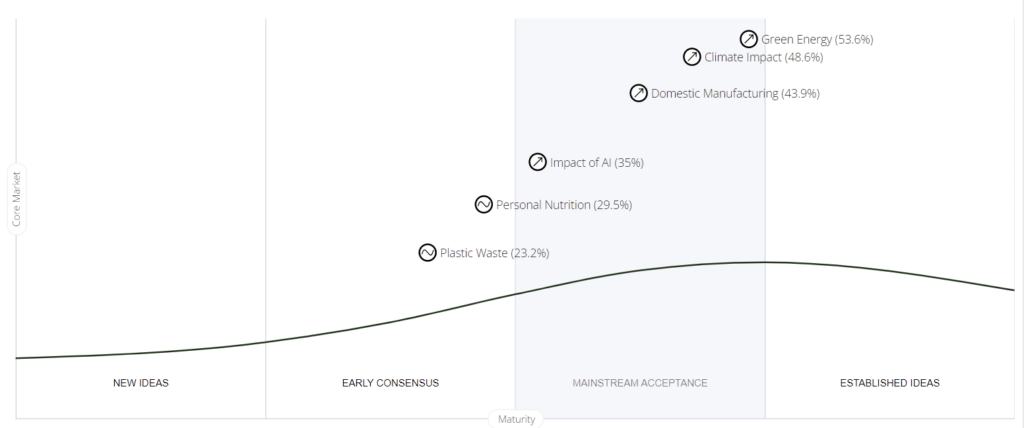The 2024 U.S. presidential election is rapidly approaching, with Americans poised to decide on November 5th whether President Joe Biden will hand over the reins next year to his vice president, Kamala Harris — or pass the office back to his predecessor, Donald Trump. While it’s become a cliché in U.S. politics that every presidential contest gets called “the most important election of our lifetime,” the unusually significant — though still incomplete — policy legacy for research, semiconductors, climate, and more that Biden has been crafting probably makes that description fair this year, at least for innovation leaders in energy, manufacturing, and consumer products.
We’ve written about the policy differences of the candidates, but the public’s views on particular issues will also help shape potential policy outcome. So, our Predictive Anthropology team also looked at consumer conversations in the context of the election on some key topics of direct relevance for innovation leaders in industry and identified six major areas:
- Green energy. Americans from both political parties agree that energy independence is a critical issue, as much as they differ on the right solutions. More conservative voters tend to believe that environmental regulations are detrimental to economic growth, as well as a threat to cherished lifestyles. Other see clean energy, and the government policies that support it, as essential for future-oriented energy security — though many are also concerned that large corporations have too much control over government policy. While they want to see solutions to climate change, they also want the new green energy economy to not fall into the hands of the established energy industry. Despite the focus, the potential policy impact here is muted as much of the Inflation Reduction act (IRA) funding has already been dispensed, and either candidate would need to control the Senate and House to modify the IRA further.
- Climate impact. There’s a stark split between supporters of the parties on climate, with Harris voters largely positive on the Biden administration’s climate policies and hopeful that the Harris administration would continue and expand those efforts. Some Trump supporters, meanwhile, view climate change as a distant issue if not an outright hoax and reject the position that drastic policy actions or lifestyle changes are necessary. There’s a gap between the groups and their motivations, however: Climate-conscious voters are strongly motivated to act on these values and prove that they are not bystanders, while those who reject climate science often find other issues more pressing. The biggest policy impact here is likely to be Supreme Court appointments, as the makeup of the court will have a major impact on the scope of administrative agencies’ power to combat climate change.
- Domestic manufacturing. Domestic manufacturing is an area of significant overlap, with both conservatives and liberals supporting government intervention to bolster made-in-America products. The conservative voters are more focused on traditional industry and business-friendly policies, including tariffs and tax cuts for oil and gas and mining industries. More liberal voters, meanwhile, are more forward looking, endorsing supportive tax policy and labor investments for future-focused industries like semiconductors, electric vehicles, and green energy. Here, we see a major impact from the election, with favored industries getting a boost depending on who wins the presidency.
- Impact of AI. Consumers are less certain about the impact of the election on AI, and fewer consumers are talking about this than some of the other policy areas. However, this culture is growing rapidly as consumers are increasingly encountering AI in their day-to-day lives. There’s a growing split between Trump and Harris supporters, with Trump voters believing that he will help prepare the workforce for new AI-driven jobs, while Harris voters are looking for ethical frameworks on the use of AI and worker protections. There is also broad concern about the use of AI to interfere with the election itself or spread misinformation. It’s not clear yet how either candidate would fully choose to engage with AI, but it’s likely that President Harris would be more antagonistic toward the burgeoning industry, if only by comparison to the deregulatory Trump.
- Personal nutrition. Consumers increasingly view health food and nutrition as deeply tied to the culture wars. For liberals, they hope that Harris will expand existing federal programs to extend access to food and improve nutrition. Conservatives meanwhile fear that sustainability measures may steer Americans away from meat, which they view as linked to a traditional American way of life. Both groups agree, however, that their choices are personal and don’t see the election impacting their individual decisions. A Harris win would likely mean relatively few changes to the current policy, while a Trump win could lead to something of a crackdown on targeted technologies like cell-based meat.
- Plastic waste. Consumers across the board are skeptical that their votes will lead to change on the issue of plastic waste — they also agree that plastic waste is an issue and that the existing plastic recycling system has been an abject failure. Trump supporters favor measures like environmental cleanup efforts, while Harris voters are broadly supportive of Biden’s increasing push to phase out single-use plastics; both care about the issue but see the problem as so pervasive and complex that it’s not likely to be impacted by one election. The Biden administration has begun ramping up pressure on the plastic issue, but without a political trifecta, Harris is unlikely to be able to implement any major reforms.
It’s worth noting that not all of these issues are equally salient for consumers — in fact, plotting on the Maturity Curve shows that green energy is the most mature issue, reflecting a greater alignment among consumers about what this topic represents. Climate impact, domestic manufacturing, and impact of AI are all growing in maturity and entering the stage of mainstream acceptance — the “zone of innovation,” where they are likely to be influential over the next president’s term.

Lux Take: While voters are concerned about a wide range of issues, this election will be seen in part as a referendum on the political efficacy of ambitious government intervention in green energy investment and early stage technology that the Biden administration has pursued. A Harris win would signal that consumers see the benefits of government investment and help cement a more proactive approach to industrial policy. A Trump win, however, could reinforce the view that the American public is unwilling to bear the near-term costs of long-term investments, as inflation and visible pocketbook issues like prices at the pump override concerns about national security, climate change, or domestic industry. While many impactful policies, like the IRA’s tax credits and investments, won’t see sharp changes based on the outcome of the election, the different views embodied by supporters of Trump and Harris reflect long-term shifts in the outlook for U.S. policy that innovation leaders should incorporate into their foresight and planning. Regardless of the victor, the prevailing political winds are likely to lead to ongoing if not accelerating protectionist policies and push for domestic industry, meaning that innovation leaders should be considering localization and supply chain resilience as key themes as well.
